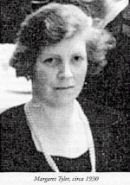BAPTISIA.
Typhoid fever. Typhoid conditions in fevers.
Rapid onset. Rapid course.
Abdomen distends early.
Odour horrible. Delirium.
Besotted condition: purple, bloated face.
Answers a word or two, and is back in stupor.
Feels there are two of him. Is scattered.
Tries to get the pieces together. (Pyrog.) In typhoid, “Baptisia vies with Pyrog and Arnica”
N. B.-In recent provings of Baptisia on examination of the blood, the typical typhoid agglutination was found to occur.
PYROGEN.
(BURNETT’S great remedy for typhoid.)
Bed feels hard. (Baptisia)
Great restlessness: must constantly move (Rhus), to relieve soreness of parts. (Arnica)
Tongue (typically) clean, smooth, fiery-red; or dry and cracked.
Horribly offensive diarrhoea. (Baptisia)
Sense of duality. (Baptisia)
Pulse quick: (characteristically) out of all proportion to temperature.
RHUS.
“Fevers take on the typhoid type, with triangular red-tipped tongue and restlessness.”
Cannot rest in any position. (Pyrog.)
Slow and difficulty mentation. May answer correctly. Talks to himself.
Refuses food and medicine. Fears that people want to poison him. (Hyoscyamus, Lachesis)
Dreams of strenuous exertion.
BRYONIA.
A most persistent remedy: develops slowly.
Lacerating, throbbing, jerking headache.
Nausea, whitish tongue, bitter taste. Thirst for large cold drinks. (Phosphorus)
“Nervous, versatile or cerebral typhoid.”
Sluggishness, then complete stupefaction.
When roused, is confused: sees images.
Thinks he is away, and wants to go home.
Irrational talk: prattles of his business: worse after 3 p.m.
Delirium apt to start about 9 p.m.
Wants to be quiet. Pain, limbs, when moving.
Tongue dry.
Easily angered.
Faint if sits up.
ARNICA.
Says she is “So well!” when desperately ill.
Can be roused, answers correctly, then goes back into stupor. (Baptisia, Phosphorus a.)
“I am not sick: I did not send for you: go away!”
Foul breath-stool. Haemorrhagic tendency.
“Bed feels so hard.” (Baptisia, Pyrog.)
“So sore,” can only lie on one part a little time: restlessness from this cause.
Involuntary and unnoticed stools and urine.
ARSENICUM.
Rapid sinking of strength: great emaciation.
Least effort exhausts.
Great restlessness: constantly moves head and limbs: trunk still, because of extreme weakness.
Face distorted, hippocratic, sunken, anxious.
Rapid sinking of forces: extreme prostration.
ANXIETY: RESTLESSNESS: EXHAUSTION.
Thinks he must die. (Arnica says “not ill.”)
Worse 1-2 a.m. and p.m.
Cadaveric aspect: cadaveric smelling stools.
Thirst for cold sips.
PHOSPHORUS.
Abdomen distended, sore very sensitive to touch. (Lachesis)
Worse lying left side: better right.
Stools offensive, bloody, involuntary.
The anus appearing to remain open. (Apis.)
Burning in stomach: burning thirst for cold water. Ices: ice cream. (Arsenicum burning, better heat.)
Fear in dark alone: thunder. Suspicious (Lachesis)
Especially useful in typhoid pneumonias.
LACHESIS.
Loquacity: delirium with great loquacity.
Face puffy, purple, mottled.
Much rumbling in distended abdomen.
Clothing must not touch abdomen or throat.
Tongue swells: difficult to protrude.
Suspicious: “Trying to poison her!” (Rhus.)
Worse after sleep: sleeps into aggravation.
Cold, clammy. (Crot. cold, dry.)
Stool with dark blood.
TEREBINTH.
Tongue bright-red, smooth, glazed. (Pyrog.)
Extreme tympanitis.
Thick scanty urine:mixed with blood, or cloudy, smoky, albuminous.
Diarrhoea with blood intermixed.
Fresh ecchymoses in great numbers. (Arnica)
CROTALUS HOR.
Typhoid with decomposition of blood and haemorrhages-anywhere.
Intestinal haemorrhage; blood dark, fluid, non-coagulable.
Tongue fiery-red, smooth, polished (Pyrog.), intensely swollen.
Yellowness of skin is an indication for Crot.
“Lachesis cold and clammy: Crot. cold and dry.”
Attacks with great rapidity. (Baptisia)
Rapidly increasing unconsciousness. Besotted appearance. (Baptisia)
Typhoid when it becomes putrid.
Diseases of the very lowest, the most putrid type, coming on with unusual rapidity.
PHOSPHORIC ACID.
“One of our best remedies in typhoid.” Simultaneous depression of animal, sensorial and mental life from the start.
Slowly increasing prostration. Advanced typhoid.
Lies in stupor, unconscious of all that goes on: but if roused is fully conscious. (Arnica)
Glassy stare, as if slowly comprehending.
Tympanitic abdomen. Dry brown tongue.
Discoloured lips, become black. Sordes.
Bleeding from nose, lungs, bowels.
Jaw drops: as if must die of exhaustion.”
HYOSCYAMUS.
Fever rapidly become typhoid. (Baptisia) Sensorium clouded.
Staring eyes. Carphology. Picks bedclothes.
Tongue dry, unwieldy, rattles in mouth, so dry. Teeth covered with sordes.
Subsultus tendinum. Involuntary stool and urine.
Mutters, or says no word for hours.
Very suspicious; refuses medicine, thinks you are going to poison him. (Rhus.)
Jealous. Alternately mild and timid, then violent. Will scratch, and try to injure.
Exposes person. (Phosphorus) Wants to be naked.
Talks to imaginary people: to dead people
Illusions: hallucinations: talking with delirium, then stupor.
Busy with wall paper, or imaginary things which he puts in rows, and leads like toys.
Early, can be roused: later, complete unconsciousness.
MURIATIC ACID. “Also one of our best remedies in typhoid.”
Tongue dry, leathery, shrunken.
Muscular prostration comes first, mind remains long clear (reverse of Phosphorus a.).
Lower jaw drops. Slides down in bed.
Cannot urinate without bowels acting.
“Nearer to Carbo veg than any remedy.”
CARBO VEG.
“A sheet-anchor in low states of typhoid, in the last stages of collapse; where there is coldness, cold sweat, great prostration; dyspnoea-wants to be fanned. Cold tongue.”
“Desperate cases. Blood stagnates in the capillaries.”
Blueness-coldness-ecchymoses.
Can hardly breathe: “Fan me! Fan me!”
Haemorrhages, dark, decomposed, unclotted. (Crot. hor.)
Indescribable paleness face and body.

